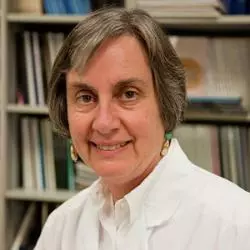
Jennifer Puck
USERN Advisory Board
Dr. Puck earned her undergraduate and medical degrees at Harvard University and Harvard Medical School, after which she completed clinical and research training in pediatrics, infectious diseases and immunology at Washington University in St. Louis, Missouri, and Baylor College of Medicine in Houston, Texas. After serving on the faculties of the University of Pennsylvania in Philadelphia and the National Human Genome Research Institute, NIH, in Bethesda, Maryland, she joined UCSF in 2006 as Professor of Pediatrics. In addition to caring for patients as an immunologist and teaching biomedical trainees at all levels, Dr. Puck has a basic and translational research program that focuses on human immune disorders as well as mouse models of lymphocyte development. Dr. Puck has used genetic and genomic technology as well as cellular immunology to study the basis of impaired lymphocyte development as well as immune dysregulation. She has published over 165 peer reviewed research papers in addition to over 90 chapters and reviews; she is co-editor of Primary Immunodeficiencies: A Molecular and Genetic Approach, published in its 3rd edition in 2014.
Noting the advantages in survival and outcome for infants with severe combined immunodeficiency (SCID) after diagnosis and treatment early in life, Dr. Puck conceived and developed a newborn screening test that uses the universally collected dried blood spots to detect SCID. DNA extracted from the blood spots is assayed by PCR to quantitate T cell receptor excision circles (TRECs), a biomarker for the generation of a normal, diverse repertoire of T cells. Absent or low TRECs suggest SCID. This testing, now part of the standard newborn screening panel in over half of the states in the US and a growing number of countries, allows infants affected with SCID and other conditions with insufficient T cells to be detected early and treated.
Dr. Puck directs the UCSF Jeffrey Modell Diagnostic Center for Primary Immunodeficiencies. She serves on the Medical Advisory Committee of the Immune Deficiency Foundation, the Committee on Primary Immunodeficiency Disease of the International Union of Immunological Societies, the Board of Scientific Councilors of NIAID, and the Steering Committees of the Primary Immune Deficiency Treatment Consortium (PIDTC) and the US Immunodeficiency Network (USIDNET). She has been elected to the American Society of Clinical Investigation (ASCI), Society for Pediatric Research (SPR), Association of American Physicians (AAP), American Pediatric Society (APS) and Institute of Medicine (IOM). She received the Abbot Award in Clinical and Diagnostic Immunology from the American Society of Microbiology in 2013 and the Colonel Harlan Sanders Award for Lifetime Achievement in Genetics from the March of Dimes in 2014.
Noting the advantages in survival and outcome for infants with severe combined immunodeficiency (SCID) after diagnosis and treatment early in life, Dr. Puck conceived and developed a newborn screening test that uses the universally collected dried blood spots to detect SCID. DNA extracted from the blood spots is assayed by PCR to quantitate T cell receptor excision circles (TRECs), a biomarker for the generation of a normal, diverse repertoire of T cells. Absent or low TRECs suggest SCID. This testing, now part of the standard newborn screening panel in over half of the states in the US and a growing number of countries, allows infants affected with SCID and other conditions with insufficient T cells to be detected early and treated.
Dr. Puck directs the UCSF Jeffrey Modell Diagnostic Center for Primary Immunodeficiencies. She serves on the Medical Advisory Committee of the Immune Deficiency Foundation, the Committee on Primary Immunodeficiency Disease of the International Union of Immunological Societies, the Board of Scientific Councilors of NIAID, and the Steering Committees of the Primary Immune Deficiency Treatment Consortium (PIDTC) and the US Immunodeficiency Network (USIDNET). She has been elected to the American Society of Clinical Investigation (ASCI), Society for Pediatric Research (SPR), Association of American Physicians (AAP), American Pediatric Society (APS) and Institute of Medicine (IOM). She received the Abbot Award in Clinical and Diagnostic Immunology from the American Society of Microbiology in 2013 and the Colonel Harlan Sanders Award for Lifetime Achievement in Genetics from the March of Dimes in 2014.
Interests
Inherited disorders of the immune system, severe combined immunodeficiency, lymphocyte development, whole exome sequencing
No items yet!
No items yet!
No items yet!